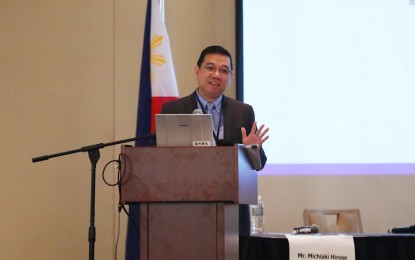
NEW POLICY. Trade Undersecretary Ceferino Rodolfo delivers his keynote speech during an economic dialogue between the Philippines and Japanese business groups at the Peninsula Manila in Makati City on Tuesday (Oct. 24, 2023). Rodolfo said the Board of Investments is drafting a policy to give incentives to modernization projects in agricultural plantation. (PNA photo by Joey O. Razon)
MANILA – The Board of Investments (BOI) will issue a new policy to encourage projects that will modernize plantations across the country.
On the sidelines of the economic dialogue between the Philippine Chamber of Commerce and Industry (PCCI) and the Japanese Chamber of Commerce and Industry (JCCI) in Makati City Tuesday, Department of Trade and Industry (DTI) Undersecretary and BOI Managing Head Ceferino Rodolfo said the new policy will be released next month.
“The Board of Investments is now finalizing a policy for modernization for agricultural plantations,” Rodolfo told reporters.
He said the BOI recognizes the need to modernize agricultural plantations to address the declining quality of fruits being harvested in the Philippines due to climate change, as well as to improve the output of the farms.
The policy is in response to the request of Sembikiya Fruits Co. Ltd., a distributor of fresh fruits in Japan, to improve the quality of tropical fruits from the Philippines, especially fresh mangoes, as well as to stabilize the supply of other tropical fruits.
Sembikiya president Hiroshi Oshima is part of the 70-member business delegation here of the JCCI that paid a courtesy call on President Ferdinand R. Marcos Jr. last Monday, and also on DTI Secretary Alfredo Pascual.
During the PCCI-JCCI economic dialogue, Oshima urged Philippine fruit plantations to improve their harvests to cater to the requirement of the Japanese market.
He said Ecuadorian bananas are eating up the market for bananas in Japan as they can meet the demand.
Rodolfo said that aside from addressing the current challenges on Philippine tropical fruits being exported to Japan, the upcoming policy will also prepare the country in anticipation of the entry into force of the Philippine-South Korea Free Trade Agreement (FTA), which will gradually eliminate tariffs of bananas and pineapple from the country entering the Korean market.
“What’s important to us is you have this policy, but very important also (are) the projects to promote the supply side development. What’s the use of your policy, the market access if you cannot supply (the demand), that’s why they go hand-in-hand,” he said.
Meanwhile, the PCCI and JCCI signed a memorandum of understanding (MOU) to partner in promoting and enhancing economic cooperation to increase trade and investments between the two countries.
Focused sectors of the MOU include information and communications technology and innovation, agriculture, manufacturing, franchising, tourism, services, and small and medium enterprise development. (PNA)
